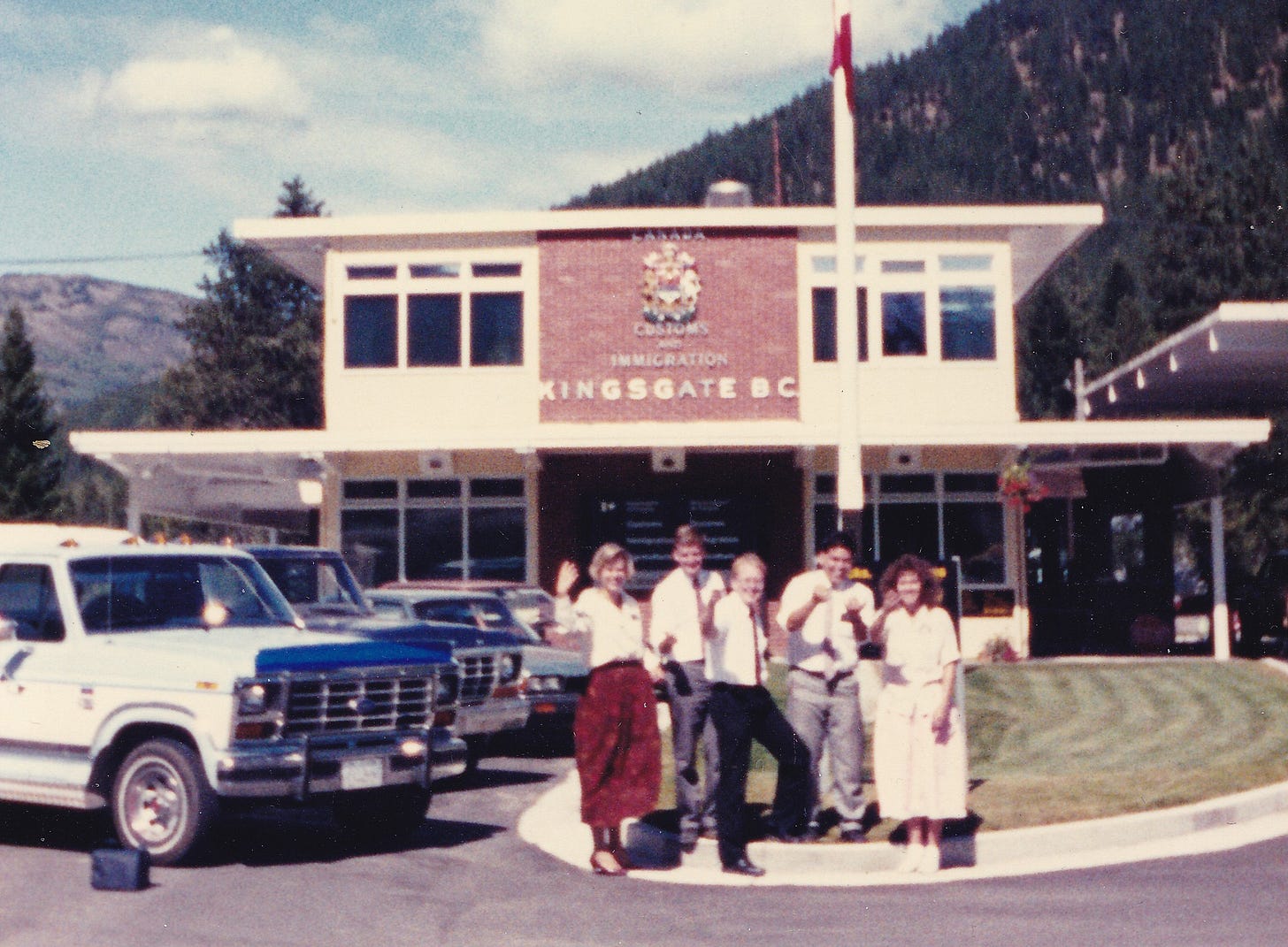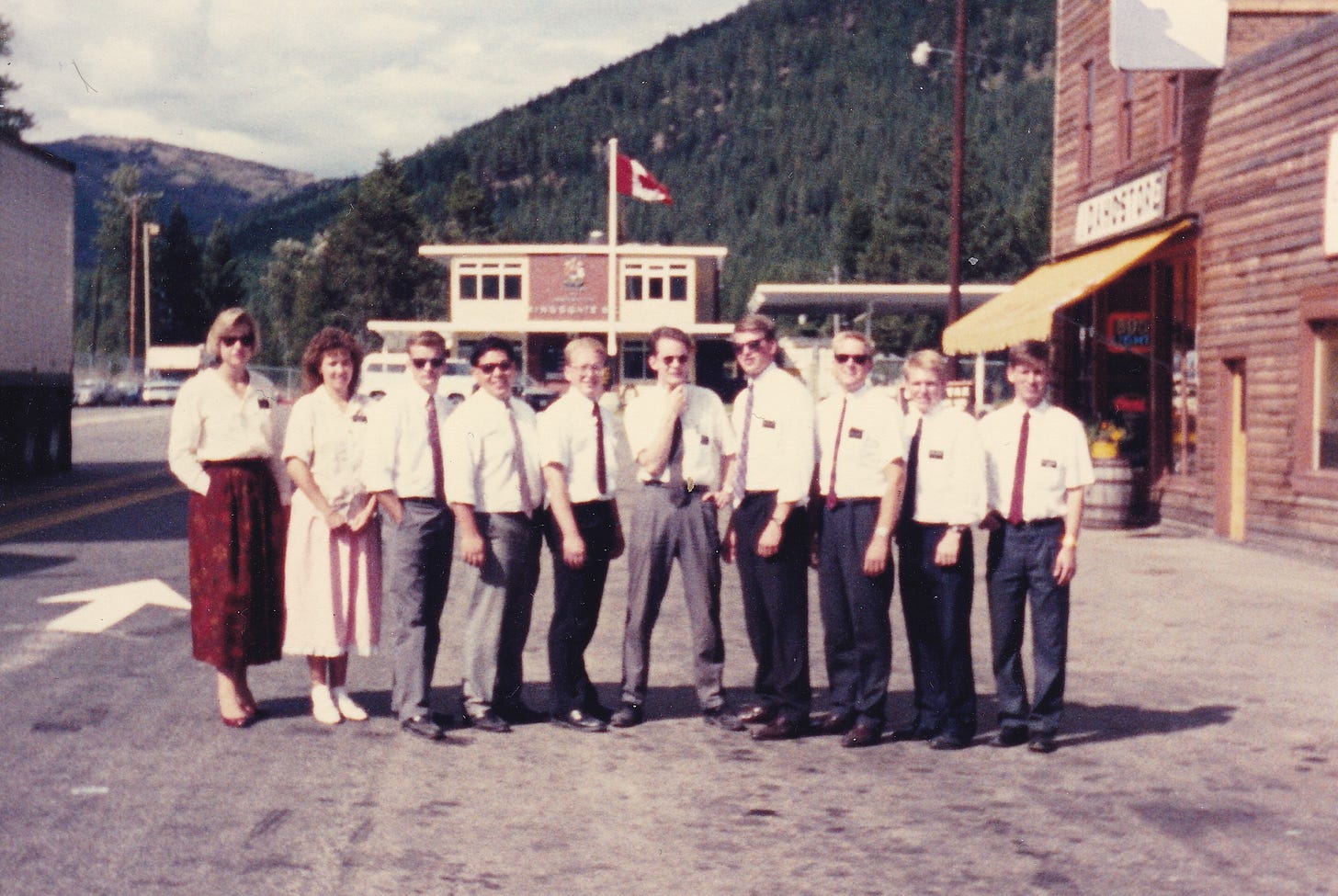Dragged into Canada, Kicking and Screaming
Thirty-eight years have passed since I’ve been allowed to set foot in America’s neighbor to the north. I'd love to go back again, but only with a proper invitation.

On a sunny afternoon late in the summer of 1987, I stood on the U.S. side of the border crossing between Eastport, Idaho, and Kingsgate, British Columbia, looking north. On the Canadian side stood a group of my fellow Mormon missionaries, lustily beckoning me to cross.
I wanted to but did not dare. My heart was pounding just being so close to the border. There was every chance that if I did join them, I’d be arrested.
True, in those days border enforcement was rather more laissez-faire than today. In many circumstances you didn’t even need a passport to enter Canada. In all likelihood I could have strolled over the line, snapped a few pics, and strolled back with no interference whatsoever. But if a border agent did happen to ask for my i.d. and run a check on it, I would have been in boiling hot water.
Only six months earlier, as a 19-year-old American missionary, I had pleaded guilty to felony mischief in a Calgary courtroom. I’ve told that story many times and in many ways over the years. Suffice it to say that after my brief sentence was served, Canada Immigration issued me a “departure notice”—less severe than deportation, but still a pointed invitation to leave their country of my own volition and never come back.
Rather than sensibly pulling the plug on my mission, the geniuses at Church HQ in Salt Lake City decided to transfer me to the Spokane Mission to serve out the remainder of my tour. Then the geniuses in Spokane decided to make me a district leader and post me to Bonners Ferry, Idaho, a mere thirty-mile drive from the border. I already had a record of making disastrous decisions. I’m not sure what any of them were thinking putting me that close to such a flashing red danger zone.
I had lived in Canada on a work visa for nearly six months before my ignominious departure. One of my former partners from back then, a go-getter named Elder Snow1, was promoted to the supervisory position of zone leader a couple of months after I left. He called me one day from his posting in Lethbridge, Alberta. “Hey, Shunn! Vickers and I are swinging through Cranbrook, B.C., to check up on the elders2 there next week. What do you say we all meet up at the border and hang out?”
Elder Vickers was the best friend I’d made at the Missionary Training Center before our posting to Canada3 , and now by random chance he and Snow were assigned as partners, supervising the only corner of the Calgary Mission that shared a border with the Spokane Mission. It was technically against the rules for them to leave mission boundaries, but Snow had never been one to let rules get in the way of having a good time, as long as no Commandments were broken. I quickly agreed.
Over the next week, as our plans firmed up, I accrued a posse of other missionaries in the area who wanted to get in on the border run. It was a novelty to get to meet people serving in a different mission, and everyone who heard about it thought it sounded like a fun time. When the big day arrived, my group had swelled to six, while the gang from Canada numbered four.

We met up in Eastport, on the U.S. side of the border, around noon. Everyone got along like a house on fire from the start, comparing notes about mission culture and slang and rules and leadership. We descended on a little cafe for lunch, where a few table were hastily shoved together to accommodate us. Over buffalo burgers, Snow caught me up on all the hot Calgary Mission gossip. It was great to see him and the others (though I sorely missed Elder Vickers, who had been detained in Cranbrook dealing with a personnel issue).
As we were finishing our boisterous lunch, Elder Snow insisted I regale the table with the story of my strip search.
“I can’t, I can’t,” I said, waving him off.
“Tell it, buckfart, come on. Stand up. Do all the, you know, the actions.”
It was a story I’d told time and again during my last few weeks in Calgary, a reenactment of the most humiliating episode of my booking into jail4. It never failed to bring the house down. Every missionary who saw it wanted me to repeat it for someone who hadn’t yet had the pleasure.
I gestured around us at the other diners. “Not here, not with all these people.”
But Snow was soon leading the rest of the table in a chant of “Strip search! Strip search! Strip search!”
What choice did I have? As the other diners looked on in confusion and probably horror, I stood at the head of the table and told the story, pantomiming a process over which the threat of a cavity search loomed like a swollen thundercloud5. I’m not sure what anyone else made of it, but my missionary posse dissolved in gales of laughter.
After that we settled up and hurried outside for photos. It was the best day I’d had since arriving back in the United States.
Why am I telling you about these frivolous few hours at the Canadian border? I’ve been thinking a lot about Canada lately, what with this pointless trade war and all of Agent Orange’s demeaning and dangerous talk about annexing our ally to the north. My Canadian friends have been posting on social media and emailing me for weeks, unsettled and angry at the increasing perception that the Mango Mussolini is trying to soften them up for some kind of takeover bid, if not outright invasion. Too accustomed to Hair Furor’s hot air, we’ve been slow in the U.S. to recognize just how seriously Canadians take the threat.
(How seriously? Seriously enough to completely reverse the fortunes of the ruling Liberal Party in the past few weeks. Seriously enough that it may be boosting military enlistments. )
That day 38 years ago was the last time I came anywhere close to the Canadian border. I’ve missed out on a lot being unable to travel there—the chance to visit friends and family, major science fiction conventions and other professional opportunities, at least one epic wedding bash, not to mention the simple pleasure of experiencing more of that remarkable country than the relatively small slice I was able to see during my short stint in Alberta.
I have a deep and abiding love for Canada. It’s true that my time there was not the happiest period of my life, but that wasn’t Canada’s fault. The people I met there were for the most part welcoming and kind. That includes not only the general populace but also the law enforcement and government officials who dealt with me during my arrest, incarceration, and trial.
Speaking of which, the swift and efficient trial was the exact opposite of what I would have expected as a criminal defendant in America. I was arrested on a Monday, and the whole proceeding was complete by that same Thursday. True, it helped that I pleaded guilty, but can you imagine the legal process running so smoothly here? I can’t.
And unlike the Grifter-in-Chief, I also can’t think of a single good reason any Canadians in their right minds would want to be part of the United States—as if a country that confederated in 1867 in part as a way of preventing annexation, and which is now routinely being taunted as the “51st state,” should be expected to slobber with gratitude at … what exactly? The right to be subjected to our world-class healthcare system? Why would they want to shoot themselves in the head? (Or rather, to let someone else do it when America’s unwillingness to control firearms spreads north?)

For the past three years I’ve been working with an immigration lawyer in Ontario—remotely, of course—to prepare an application for a suspension of my criminal record in Canada, as prelude to applying to reenter the country. After so much time, it seems absurd that I can’t visit friends and relatives in Calgary, Saskatoon, Toronto, Montréal. I’d like to be able to do all that while I’m still able to get around.
As part of the process, I’ve been trying to write an essay about what makes me a good citizen, one who is rehabilitated and stable, and who poses no risk to public safety. I’ve been struggling with this assignment, not because I think I do pose any risk to public safety but because for a variety of non-legal reasons I’m having a hard time applying the word “good” to myself.
These days, though, it feels like I could just assert my fervent belief in Canadian sovereignty and my fierce desire for the U.S. to keep its filthy hands to itself and start behaving like a decent neighbor again. I think that might just do the trick.
Missionaries love to take pictures, and we took plenty that day at the border. Some of the more amusing photos include one with my five Spokane Mission colleagues lined up on one side of a border marker while I stand alone on the other side, or one where I’m apprehensively inching a toe over the line in defiance of my own better instincts.
A photograph I don’t have in my collection is the one taken when a bunch of the other missionaries grabbed me and dragged me across the border struggling and bucking. They thought this was hilarious. I did not, and I raced back to safety the second they let go of me.
A Canadian friend forwarded an article to me recently speculating that plans are in the works for an American invasion. He rather archly suggested that the day may soon come when I won’t need to jump through any hoops to drop in for a visit.
Sorry, but if that’s the only way I have to get there, I’d rather stay home. If I can’t reenter a sovereign Canada the right way, then the only way you’ll get me there again is to drag me kicking and screaming. ∅

My memoir, The Accidental Terrorist: Confessions of a Reluctant Missionary, is available from all the usual sources online, though I would encourage you to order it either from your local independent bookstore or from Bookshop.org.
Not his actual name, but that’s what I called him in The Accidental Terrorist, so I’m using it here too.
Yes, these so-called “elders” were teenage boys in or barely out of their teens.
I’ll have an amusing anecdote about Vickers—also not his actual name—and our time at the MTC to share in a few weeks.
For the grotty details, please see Chapter 41 of The Accidental Terrorist.







Can’t believe it has been that long since our district meeting at the border lol. Was wondering who the four elders were, and you answered that (Calgary mission). I’d forgotten. Recognized Cavanaugh, Bishop, Choi, and Oyler. Well, I hope that Canada stays strong and resists the bullying from drumph and that you get to make a trip to sovereign Canada someday soon, Shunn. (Aka Sister Barkdull)
I always enjoy these stories.